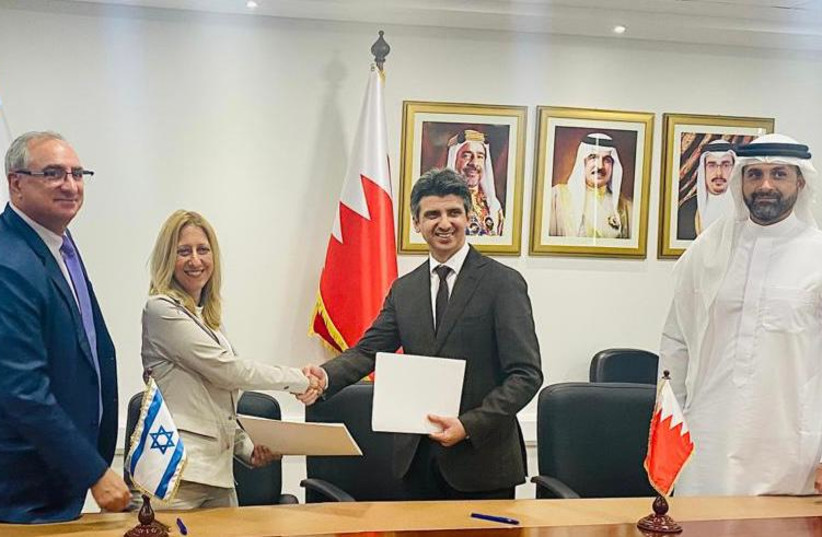Israel-Gulf ties not dead, envoy to Bahrain says following Iran-Saudi deal

Na’eh said everyone would do well to wait and see if the establishment of Iranian-Saudi ties even comes to fruition.
MANAMA – Reports of the death of Israeli-Gulf ties as a result of the announcement Friday of a renewal of Saudi-Iranian relations are greatly exaggerated, Israeli Ambassador to Bahrain Eitan Na’eh indicated on Tuesday.
“I don’t know what the future will bring. I know what I’m told, and I know what I see,” he told journalists at press briefing at Start-Up Nation Central’s “Connect2Innovate” conference in Bahrain. “I am not yet ready to start eulogizing Israel-Gulf relations.”
On the contrary, he said, the fact that 530 Bahraini businesspeople – along with a government minister and senior government officials – are taking part in the conference and meeting some 60 Israeli businesspeople and officials indicates an interest in moving Bahrain’s ties with Israel forward.
“They could have used any excuse not to come,” he said. “I see what I see.”
Na’eh said everyone would do well to wait and see if the establishment of Iranian-Saudi ties even comes to fruition.
“You are in the Middle East,” he said, adding that there was a great deal of “excitement” about the Chinese-brokered announcement in Israel. “It is the Saudis and the Iranians. Read carefully what they said – I think most of what was said was said by the Iranians.”
Na’eh, who has been Israel’s ambassador in Bahrain for more than a year and before that spent some nine months as Israel’s envoy to the UAE, said one thing he has learned in the Gulf states is that “there is a lot of history.”
The Saudi-Iranian story is not new
The Saudi-Iranian story “did not start yesterday,” Na’eh said, referring to the long history of enmity and rivalry between the two Islamic powers, one Sunni (Saudi Arabia) and the other Shia.
This story “didn’t start” in 2016 when the Saudis executed a Shia religious figure, and the Iranians cut off diplomatic relations, he said. “There is a history,” he added.
In discussing the rapprochement, Na’eh recalled the Russian fable of the scorpion and frog crossing the river, where the scorpion tried to convince a frog to carry it across. When the frog protested that the scorpion might sting it, the scorpion said this would be ridiculous, because if he killed the frog, he, too, would drown.
Nevertheless, the scorpion stung the frog halfway across, and when the frog asked why it did so – dooming them both – the scorpion replied, “I couldn’t resist the urge; it’s in my nature.”
“I don’t think anyone has any doubt who is the scorpion and who is the frog,” when it comes to Iran and Saudi Arabia, he said.
Na’eh said among the biggest challenges he faces in Bahrain is changing preconceived perceptions of Israel.
Everyone was impressed and excited by the big governmental ceremonies that came with and continued after the signing of the Abraham Accords, he said.
But it is important to remember what goes through the mind of the Bahrainis, Na’eh said.
“For decades, they have been hearing about Israel – about what it does in the West Bank, in Lebanon,” he said. “I call it blood, smoke and fire. So, the first thing you have to do when you come here is work on people’s minds and say, ‘Look, we are not that scary.’ People [from Bahrain] who go to Israel are genuinely anxious about what they will see.”
A greater understanding of the complexity of the country
When they do go, they are often wowed by what they see and gain a greater understanding of the complexity of the country, Na’eh said, adding that only about 500 Bahrainis, excluding diplomats and members of the royal family, have come to Israel since the signing of the accords.
"This is my first priority: to really get people to understand – sometimes bring people to Israel one by one, sometimes in delegations," Na’eh said.
“It’s the people,” he added. “You don’t invest in a place you never visited. You don’t do business in a place you never visited. You don’t do business with people you’ve never met.”
Jerusalem Post Store
`; document.getElementById("linkPremium").innerHTML = cont; var divWithLink = document.getElementById("premium-link"); if (divWithLink !== null && divWithLink !== 'undefined') { divWithLink.style.border = "solid 1px #cb0f3e"; divWithLink.style.textAlign = "center"; divWithLink.style.marginBottom = "15px"; divWithLink.style.marginTop = "15px"; divWithLink.style.width = "100%"; divWithLink.style.backgroundColor = "#122952"; divWithLink.style.color = "#ffffff"; divWithLink.style.lineHeight = "1.5"; } } (function (v, i) { });

